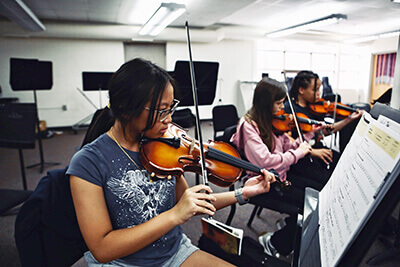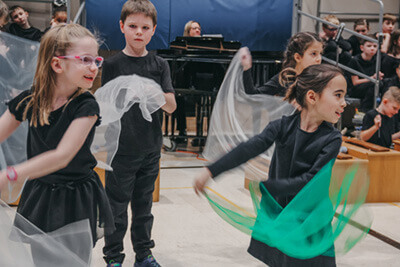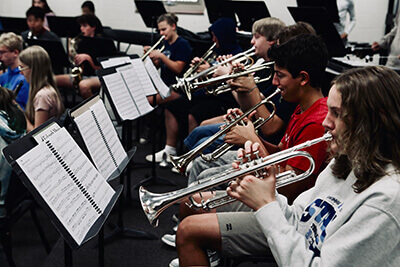April 29, 2025
 At Mounds Park Academy, music is much more than an extracurricular activity. It plays a vital part in a child’s cognitive and emotional development by engaging the brain in ways few other disciplines can. It sharpens memory, strengthens attention, and boosts language skills. But beyond academic growth, music also nurtures empathy, creativity, and social and emotional intelligence through composing, performing, or simply listening. This is why music plays an essential role in Mounds Park Academy’s whole child, progressive, college-preparatory curriculum, PreK through grade 12.
At Mounds Park Academy, music is much more than an extracurricular activity. It plays a vital part in a child’s cognitive and emotional development by engaging the brain in ways few other disciplines can. It sharpens memory, strengthens attention, and boosts language skills. But beyond academic growth, music also nurtures empathy, creativity, and social and emotional intelligence through composing, performing, or simply listening. This is why music plays an essential role in Mounds Park Academy’s whole child, progressive, college-preparatory curriculum, PreK through grade 12.
In a time when standardized testing is heavily emphasized and there are rising concerns about math and science scores within our nation, parents might question MPA’s emphasis on arts education. From the school’s founding, our curriculum has reflected an intentional balance between academics and the arts. Through new and emerging research, we now know they were correct.
Cognitive Benefits of Music Education
The Frontiers in Neuroscience article, “How Musical Training Affects Cognitive Development,” states that children exposed to musical training have better verbal memory, language pronunciation and accuracy, reading ability, and executive functions, because of how the brain processes sound. Nina Kraus, author of “Of Sound Mind,” said “People think of the hearing brain as being a silo within the brain. In fact, our hearing engages our cognitive, sensory, motor, and reward systems.” Music learning is so powerful because it engages every one of the above systems into a single activity. Kraus asks us to consider playing the violin. “To play the violin, a student coordinates their motor, cognitive, and sensory system to be able to put their fingers on the correct strings and move the bow at the right time; to read musical notes on a sheet of music and know what sounds they represent; and to hear if the pitches and rhythms are correct and coordinating with other players at the same time,” she goes on to say that this elicits a certain feeling from the student playing the music, which triggers the reward system within the brain. Engaging these different systems makes learning music one of the richest and deepest brain activities humans can perform. Simply put, “Teachers resoundingly tell me that children who participate in creating music do better in school,” Kraus states.
Anita Collins, in her book “The Music Advantage,” explains that producing and reading music activates the same “phonological loop” in the human brain as when kids are learning to read words. Collins describes the exact neurological relationship between the two:
- The eye sees a symbol on the page, whether it’s an eighth note D, or a letter “t” at the start of a word.
- The brain hears the sound, pulling it from the memory of music and speech sounds that all brains possess.
- The brain instructs the body to make that sound, whether it’s hands playing an instrument or the mouth shaping itself to make the “t” sound.
- The brain listens to be sure the correct sound was made, and then adjusts as necessary.
 These are just some of the reasons why music is infused throughout every grade level at MPA.
These are just some of the reasons why music is infused throughout every grade level at MPA.
MPA’s Music Curriculum
In Lower School, rhythm is a focal point, the launching point for musical studies paired with song and dance. Students are given many opportunities to share their movement and musical performances throughout the school year. They spend time in a rich study of Orff instruments, moving to the final stage of recorder and composition to best prepare for Middle School music. In Middle School, students join either band or orchestra in addition to participating in choir, laying the foundation for continuing development in the coming years for more advanced study of vocal and instrumental music. Upper School creates opportunities for students to hone their musical technique and expertise by participating in six different instrumental ensembles and three choral groups. Music is a pillar of MPA’s robust curriculum and whole-child education.
Interpersonal Connections and a Global Language
For thousands of years, music has created community through music and songs. Collins explains that “music taps into a primal bond that may encourage prosocial behavior like empathy and helping.” This is further supported in the Neuroscience Frontier article, which explains that making music in groups is suggested to increase communication, coordination, and cooperation between people. At MPA, our motto is to Dream Big, Do Right, which goes far beyond academic skill. A person’s ability to listen to, speak with, and hear opposing ideas entails a deep sense of cooperation and empathy for others. To successfully Dream Big and Do Right, we can rely on music study to help teach these skills.
Daniel Barenboim, both a pianist and conductor, founded the West-Eastern Divan Orchestra. This orchestra is comprised of young musicians from Israel, Palestine, and other Middle Eastern Countries. Daniel states, “The power of music lies in its ability to speak to all people, regardless of culture, language, or history. It creates a shared space where understanding and empathy can flourish.” By having these young musicians play together in an orchestra under one common musical language, the concentration on their differences subsides, and the commonality becomes their human spirit and music.
 If you were to walk into a Mounds Park Academy homecoming assembly, the entire school would be joyfully singing the school song. Wander into our preschool room, and you would hear songs being sung about lining up or washing hands. And if you have the privilege of attending our Lower School Art and Music Show in the spring, you would experience choreographed movement pieces for Vivaldi’s “Four Seasons” to “Fireflies” by Owl City. Orff instruments, voices, and movement would be interwoven together by kindergartners through fourth graders, producing one performance in unity while celebrating and highlighting different cultures of our world.
If you were to walk into a Mounds Park Academy homecoming assembly, the entire school would be joyfully singing the school song. Wander into our preschool room, and you would hear songs being sung about lining up or washing hands. And if you have the privilege of attending our Lower School Art and Music Show in the spring, you would experience choreographed movement pieces for Vivaldi’s “Four Seasons” to “Fireflies” by Owl City. Orff instruments, voices, and movement would be interwoven together by kindergartners through fourth graders, producing one performance in unity while celebrating and highlighting different cultures of our world.
Music is our universal language. It bridges differences, unites communities, and celebrates different cultures. By listening to and actively engaging in music education, children foster empathy, reduce bias, and promote a sense of global citizenship. It is the epitome of “Dream Big. Do Right.”
A Better Education Through Music
The research is all incredibly clear: music makes education better. It builds memory, helps with literacy, teaches executive functioning, encourages social and emotional learning, and directly teaches communication and cooperation. The reasons to study music are countless, “but, let’s not forget,” said now retired, long-time Lower School music teacher, Mari Espeland, “that we also study music because it is beautiful, because it gives us peace and comfort, and there are few things as wonderful as singing with a group of people, creating a shared sound and generating something greater than yourself.”